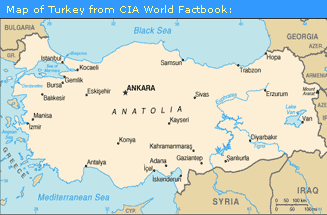Turkey straddles Europe and Asia, but its dualistic nature is not limited to geography. Once the seat of the mighty Ottoman Empire’s Islamic caliphate, its constitution calls for secular governance. Unlike many other Mideast nations, Turkey has substantial experience with democratic principles; its founder, Kemal Atatürk, established a Western-style government within two years of overthrowing the sultan in the early 1920s. It is a parliamentary democracy, yet the military is widely accepted as a political watchdog against political Islamic fundamentalism; in 1997, the military helped oust the Islamic-oriented government without firing a shot. Turkey has a longstanding military and trade relationship with Israel, by far the closest alliance Israel shares with any nation in the Middle East. Islamic observance is on the rise, yet the state maintains restrictions on women wearing headscarves in public settings. In 1998, an up-and-coming politician named Recep Tayyip Erdogan was convicted for reading publicly an allegedly violence-inciting Islamist poem, and his party was banned the same year; five years later, Erdogan — who has since toned down his rhetoric — became Turkey’s prime minister. In late 2004, the European Union agreed that Turkey can begin E.U. membership talks in October 2005. The membership process may take well more than a decade, but it has already generated opposition in Europe. Some pundits saw recent rejections of the E.U. constitution, by France and the Netherlands, as a referendum on Turkey; others point to the complex domestic issues leading to those countries’ “no” votes. What is certain is that Turkey’s E.U. aspirations have hastened reform. The country banned the death penalty in 2002, and press restrictions have been eased — though not eliminated. Many observers believe that negotiations for E.U. membership will further enhance and solidify democracy in Turkey.
- Previous: Syria
- Next: United Arab Emirates



